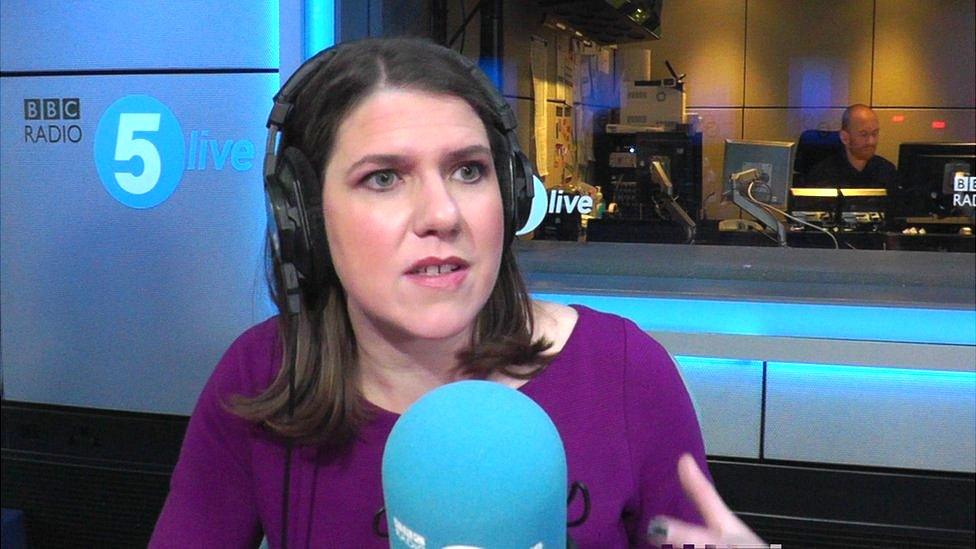General election 2019: Jo Swinson BBC phone-in claims fact-checked
- Published

Liberal Democrat leader Jo Swinson took questions from the public in a phone-in broadcast on 5Live and the BBC News Channel on Monday.
Reality Check has been looking at some of the claims she made during the hour-long programme.
Claim: The Liberal Democrats would do the most for the poorest people
A listener called Margaret asked how the Lib Dems would lift children out of poverty.
Jo Swinson said her party would do the most for the poor. She cited a report from the Resolution Foundation think-tank, external, which had done "an analysis that says the Liberal Democrat plans are the most progressive, the plans that will help the poorest people the most."
The report does says that the Lib Dem manifesto would do more for the poorest 10% of families in the UK than Labour or the Conservatives (it only looked at three parties).
The Lib Dems propose £9bn of extra cash for welfare payments, and £8bn of other benefits such as free school meals and childcare. They would scrap the two-child limit on child benefit, and the benefit cap.
This would make the incomes of the poorest tenth of the population 25% higher by 2023-24 than current government plans, according to the Resolution Foundation.
Labour's policies would see an increase of 20%. The Conservatives' manifesto would leave things broadly as they are.
However, this analysis only looks at benefits and taxation, and does not include some Labour ideas, such as the £10-an-hour minimum wage, which would benefit poorer families.
Under the Conservatives' plans, there would be a substantial increase in child poverty by 2023-24, according to the Resolution Foundation.
The Lib Dems' proposals would see an estimated 600,000 fewer children in poverty than Conservative plans. Labour's plans would see 550,000 fewer.
Claim: Staying in the EU will deliver a £50bn "Remain Bonus"
Gavin from Winchester phoned up to question the Lib Dems' claim that there would be more money for the government to spend if Brexit is cancelled.
Ms Swinson explained that the party's "Remain Bonus" was the extra tax that the government would raise because the economy would grow faster if Brexit was cancelled.
She said: "This is the extra money that would be available to invest in public services. It's entirely likely that it would be more than £50bn over the next five years, but... we have gone for a cautious estimate."
The £50bn is the accumulated extra money the government would take in over the next five years - by 2025 it would be £14bn a year, based on the economy being about 2% bigger.
This is extra money, even when ongoing contributions to the EU budget are taken into account.
The Institute for Fiscal Studies says this is "within the range of plausible estimates, external." However £14bn would only be around 1.5% of total government revenue in 2024-25.
Claim: The Conservatives "want to water down human rights legislation"
In a discussion about Brexit, Jo Swinson spoke about the importance of equality and human rights, and said that the Conservatives would threaten them.
"We have already seen the Conservatives saying they want to water down human rights legislation if we leave the EU," she said.
The Conservative manifesto is actually quite vague on their plans on human rights. It only says that after Brexit "we will update the Human Rights Act and administrative law to ensure that there is a proper balance between the rights of individuals, our vital national security and effective government."
However, during the campaign the Conservatives outlined their proposed changes to the Human Rights Act, which they claim would help to protect UK servicemen from what they call "vexatious legal claims".
These would include updating the Human Rights Act, which enshrines the European Convention on Human Rights (ECHR) into UK law. This would prevent it being applied to events prior to its coming into force in 2000, and limit its application to service personnel on operations abroad.
They say this would prevent soldiers being unfairly prosecuted or pursued in civil courts for alleged crimes during the "Troubles" in Northern Ireland between 1963 and 1998, or more recently in Iraq and Afghanistan.
These plans have been opposed by pressure groups such as Liberty, and some individual lawyers, who oppose attempts to alter the Human Rights Act.
It's worth noting that the European Convention on Human Rights is separate from the European Union. It is enforced by the Council of Europe - a different organisation.


